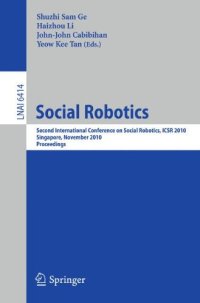
Ebook: Social Robotics: Second International Conference on Social Robotics, ICSR 2010, Singapore, November 23-24, 2010. Proceedings
- Genre: Technique // Electronics: Robotics
- Tags: Artificial Intelligence (incl. Robotics), User Interfaces and Human Computer Interaction, Computers and Society, Computer Appl. in Social and Behavioral Sciences, Computer Imaging Vision Pattern Recognition and Graphics, Special Purpos
- Series: Lecture Notes in Computer Science 6414 : Lecture Notes in Artificial Intelligence
- Year: 2010
- Publisher: Springer-Verlag Berlin Heidelberg
- Edition: 1
- Language: English
- pdf
The papers in this volume were the fruitful scientific results of the Second International Conference on Social Robotics (ICSR), held during November 23–24, 2010 in Singapore, which was jointly organized by the Social Robotics Laboratory (SRL), Interactive Digital Media Institute (IDMI), the National University of Singapore and 2 Human Language Technology Department, the Institute for Infocomm Research (I R), A*STAR, Singapore. These papers address a range of topics in social robotics and its applications. We received paper submissions from America, Asia, and Europe. All the papers were reviewed by at least three referees from the 32-member Program Committee who were assembled from the global community of social robotics researchers. This v- ume contains the 42 papers that were selected to report on the latest developments and studies of social robotics in the areas of human––robot interaction; affective and cognitive sciences for interactive robots; design philosophies and software archit- tures for robots; learning, adaptation and evolution of robotic intelligence; and mec- tronics and intelligent control.
This book constitutes the refereed proceedings of the Second International Conference on Social Robotics, ICSR 2010, held in Singapore, in November 2010. The 42 revised full papers presented were carefully reviewed and selected from numerous submissions. The papers are organized in design philosophies and software architectures for robotics; social acceptance for human-robot interaction; learning, adaptation and evolution of robot intelligence; mechatronics and intelligent control; HRI in assistive technologies for people with special needs; affective and cognitive sciences for interactive robots; and interaction and collaboration.